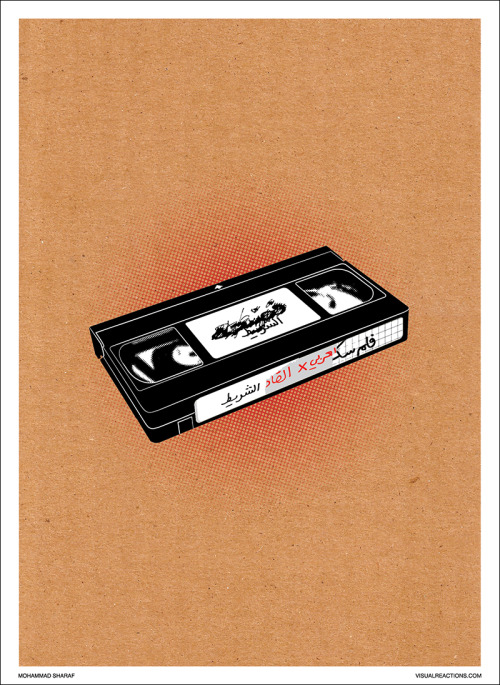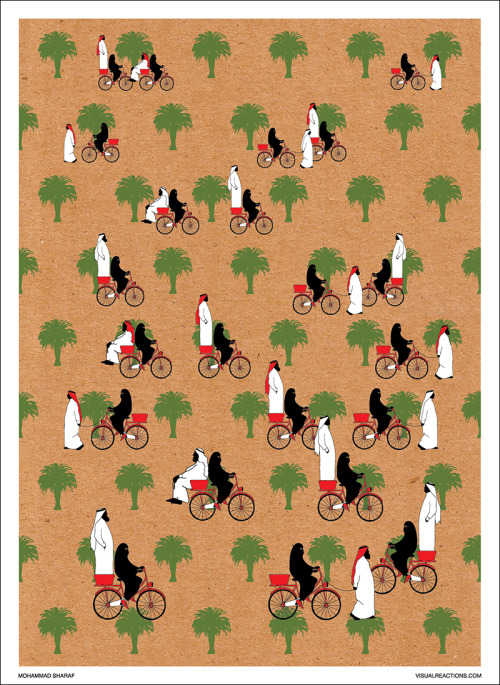Anonymous asked: I saw your work at my university. I think your focus on the fact that women can't drive in KSA is really silly and frivolous. Obviously it's wrong that we can't drive and that the validation is ridiculous, but making it a center for attention when there is SO many other terrible things going on in the world makes me feel like you are censoring art to sell to the west. That's not very respectable.
Dear anonymous,
Thank you for your comment.
The fact that a particular exhibition focus was on Saudi women to drive, does not mean that my focus is that issue in particular. Obviously, you visited my Tumblr page, and I wish you had the time to go through the old posts. I tackled many social and political issues, in Kuwait, Saudi, Bahrain, Egypt, and many other countries. I did not make it the center for attention, nor I want to sell to the west. The people who interacted most with this piece in particular were mostly Arab, and Saudi in particular. It just happened that this piece in particular got viral and people around the world could relate to it. I’ve done art work on minor marriage, women rights, poverty in Somalia, freedom of speech in Bahrain, and Kuwait, and many other social issues. I wish you have the time to go through my older posts, and not pre-judge me and my work because of one observation you had.
Mohammad
Anonymous asked: What is the meaning of "Sold?"? What are you trying to convey in this piece?
Its about people whom opinion, and votes could be bought for money or another form of dirty political money. They always have a price tag for their silence, or speech.
Anonymous asked: are you a feminist?
I am note quite sure what this exactly mean. I don’t like to categories myself anyways.
Anonymous asked: Don't you think that all the new logos of public institutions represent a regression in the Kuwaiti graphic design landscape?
Well, to sum it all, each time I find out that there is a new logo designed for a public organization, I feel embarrassed, annoyed, and mad.
الكتاب
العملعبارةعن مجسم مجازي يمثل كيفية حفظ الكلام المقدس . الكلام المطبوع على صفحات الكتاب عبارة عن مواد من الدستور الكويتي و الذي يرجع به التاريخ إلى ستينات القرن الماضي ، تم وضع أرقام تلك المواد داخل إطار زخرفي و هو نفس الإطار الذي يستخدم في الفصل بين آيات القرآن . الخط المستخدم في طباعة الكتاب هو نفسه الخط المتعارف على استخدامه في تلك الحقبة ، و مواد الدستور الظاهرة على صفحات الكتاب هي المواد التالية:
(مادة 174)
للأمير ولثلث أعضاء مجلس الأمة حق اقتراح تنقيح هذا الدستور بتعديل أو حذف حكم أو أكثر من أحكامه، أو إضافة أحكام جديدة إليه. فإذا وافق الأمير وأغلبية الأعضاء الذين يتألف منهم مجلس الأمة على مبدأ التنقيح وموضوعه، ناقش المجلس المشروع المقترح مادة مادة، وتشترط لإقراره موافقة ثلثي الأعضاء الذين يتألف منهم المجلس، ولا يكون التنقيح نافذا بعد ذلك إلا بعد تصديق الأمير عليه وإصداره، وذلك بالاستثناء من حكم المادتين 65 و 66 من هذا الدستور. وإذا رفض اقتراح التنقيح من حيث المبدأ أو من حيث موضوع التنقيح فلا يجوز عرضه من جديد قبل مضي سنة على هذا الرفض. ولا يجوز اقتراح تعديل هذا الدستور قبل مضي خمس سنوات على العمل به.
(مادة 175)
الأحكام الخاصة بالنظام الأميري للكويت وبمبادئ الحرية والمساواة المنصوص عليها في هذا الدستور لا يجوز اقتراح تنقيحها، ما لم يكن التنقيح خاصا بلقب الإمارة أو بالمزيد من ضمانات الحرية والمساواة. (مادة 176) صلاحيات الأمير المبينة في الدستور لا يجوز اقتراح تنقيحها في فترة النيابة عنه.
(مادة 176)
صلاحيات الأمير المبينة في الدستور لا يجوز اقتراح تنقيحها في فترة النيابة عنه
(مادة 177)
لا يخل تطبيق هذا الدستور بما ارتبطت به الكويت مع الدول والهيئات الدولية من معاهدات واتفاقات
–
The Book
The artwork is a metaphoric installation of how a sacred text is preserved. This text dates back to the 1960s and keeps articles from Kuwaits’ Constitution. The article numbers are placed inside an ornament frame, the same shape used to separate Quran verses. The printed typeface was commonly used in official documents and publications during the last century. The translation of the articles is as follows:
- 174 -
The Amir or one-third of the members of the National Assembly have the right to propose a revision of the Constitution by amending or deleting one or more of its provisions or by adding new provisions. If the Amir and the majority of the members constituting the National Assembly approve the principle of revision and its subject matter, the Assembly debates the bill article by article. Approval by a two-thirds majority vote of the members constituting the Assembly is required for the bill to be passed. The revision comes into force only after being sanctioned and promulgated by the Amir regardless of the provisions of Articles 65 and 66. If the principle of revision or its subject matter is rejected, it may not be presented again before the lapse of one year from the rejection. No amendment to this Constitution may be proposed before the lapse of five years from its coming into force.
- 175 -
The provisions relating to the Amiri System in Kuwait and the principles of liberty and equality, provided for in this Constitution, may not be proposed for revision except in relation to the title of the Emirate or to increase the guarantees of liberty and equality.
- 176 -
The powers of the Amir, specified in this Constitution, may not be proposed for revision when a Deputy Amir is acting for him.
- 177 -
The application of this Constitution does not affect treaties and conventions previously concluded by Kuwait with other States and international organizations.
—
Edition 1/3
Medium: Resin, and Mixed Media Installation
Date: 2013




